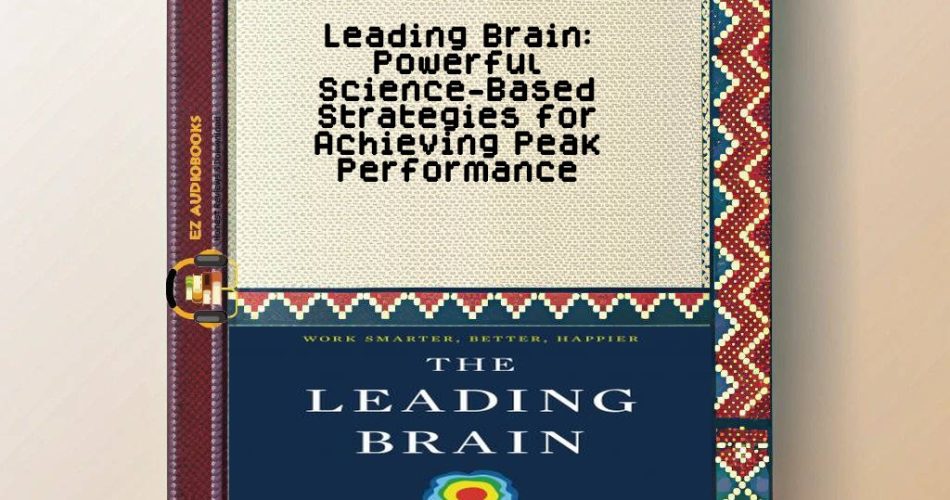Audiobook Sample
Listen to the sample to experience the story.
Please wait while we verify your browser...
- Title: Leading Brain: Powerful Science-Based Strategies for Achieving Peak Performance
- Author: Friederike Fabritius, Hans W. Hagemann
- Narrator: Karen Saltus
- Length: 08:16:06
- Version: Abridged
- Release Date: 01/03/2017
- Publisher: Ascent Audio
- Genre: Business & Economics, Management & Leadership, HR & Office Administration, Business & Economics, Management & Leadership, HR & Office Administration
- ISBN13: 9.78E+12
As someone who has spent decades analyzing how narrative structures shape human understanding, I approached “The Leading Brain” with both professional curiosity and personal anticipation. The promise of neuroscience-based leadership strategies immediately reminded me of my graduate school days at Harvard, where I first encountered the fascinating intersection of cognitive science and humanities through works like Oliver Sacks’ “The Man Who Mistook His Wife for a Hat”. This audiobook version, narrated with crisp precision by Karen Saltus, delivers on its ambitious premise while offering some delightful surprises along the neural pathways.
What fascinates me most is how Fabritius and Hagemann have crafted what I can only describe as a ‘cognitive toolkit’ for modern leadership. Their approach reminds me of my semester teaching in Tokyo, where I observed how different cultural frameworks shape decision-making processes. The authors’ German academic rigor (Fabritius’s neuropsychology background) blends seamlessly with Hagemann’s practical consulting experience, creating a work that satisfies both the analytical and pragmatic mind.
The audiobook’s structure mirrors effective cognitive architecture – beginning with fundamental concepts about how our brains function under stress (the amygdala hijack phenomenon), then building toward sophisticated applications for team dynamics and innovation. Saltus’s narration deserves particular praise for maintaining clarity through complex scientific explanations while adding just enough vocal variety to keep the material engaging during more technical sections. Her pacing during the ‘Neuro-Toolbox’ segments (Chapter 7) particularly stands out, allowing listeners to absorb the practical applications without feeling overwhelmed.
Through a cultural lens, I appreciate how the authors navigate the Western individualist bias common in leadership literature. Their discussion of ‘psychological safety’ in teams (Chapter 9) resonates deeply with my cross-cultural research, particularly the examples drawn from multinational corporations. The comparison between Eastern collective approaches and Western individual achievement models creates a nuanced perspective that’s rare in business audiobooks.
This reminds me of when I conducted a media comparison study of “Cloud Atlas” in my Berkeley seminar – the audiobook format proves particularly effective for “The Leading Brain” because complex neuroscientific concepts benefit from vocal articulation. Saltus’s careful enunciation of terms like ‘neuroplasticity’ and ‘dopaminergic reinforcement’ makes these concepts more accessible than they might appear in print. The production quality enhances this effect, with well-timed pauses that allow for cognitive absorption.
However, the audiobook isn’t without limitations. Some listeners might crave more case studies from creative industries (the examples lean toward corporate and tech environments). Additionally, while the science is impeccably researched, the leadership applications occasionally feel slightly abstract – I found myself wishing for more concrete ‘if-then’ scenarios, especially in the decision-making sections.
Compared to similar works like Daniel Kahneman’s “Thinking, Fast and Slow” (which focuses more on cognitive biases) or Angela Duckworth’s “Grit” (with its narrower focus on perseverance), “The Leading Brain” offers a unique value proposition by specifically bridging laboratory findings with boardroom applications. The ‘Focus-Rest-Diet’ framework (Chapter 5) alone justifies the listening time, presenting scientifically-grounded alternatives to the toxic ‘always-on’ leadership culture.
For potential listeners, I’d recommend approaching this as a ‘slow listen’ rather than background material. The density of insights warrants focused attention, preferably in 30-45 minute sessions with time for reflection. Business leaders will find immediate applications, while psychology enthusiasts will appreciate the rigorous yet accessible science. The audiobook’s modular structure also allows for targeted revisiting of specific chapters as needed.
As we navigate an era where remote work and digital distractions challenge traditional leadership models, “The Leading Brain” provides not just timely answers but more importantly, science-based frameworks for asking better questions. It’s rare to encounter a work that so effectively bridges the gap between academic research and practical wisdom while maintaining such high production values in its audio presentation.
With intellectual curiosity and a renewed appreciation for our brain’s extraordinary capabilities,
Prof. Emily Chen

